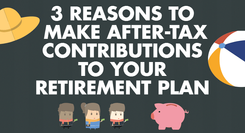Related Posts
Employers and Organizations
Your Employees Don't Know as Much About Personal Finances as They Think
Last Update: December 25, 2023
Financial literacy is a necessary skill for everyone in the workforce, whether employers or employees. Despite the importance of this knowledge, financial literacy among Americans has been falling over recent years.
Employers have a responsibility to ensure that their employees have all the necessary tools and education to make good financial decisions, both in their personal lives and for their businesses. But how can they do this?
In this article, we will discuss the current state of financial literacy among American workers and what employers can do to help improve it.
What Your Employees (Think They) Know
In the digital age, we have an ever-growing number of digital tools and media at our fingertips that can teach us about personal finances and investing. Even as these tools are becoming more and more accessible, however, recent research has found that financial literacy is not common knowledge.
The National Financial Capability Study (NFCS) is a recurring study of Americans' knowledge of finances. While it did find that financial literacy is slowly increasing after the pandemic, only about half of Americans have their basics covered (emergency savings funds, retirement plans, etc.).1
Unfortunately, despite the notable absence of financial wellness and knowledge in the country, a recent study from Ohio State University shows that many Americans are still feeling confident when it comes to their money management skills.2
The researchers tested and surveyed individuals from 2009 and 2018, not only testing for a person's financial knowledge but also their confidence in their abilities. Data showed that one-fifth of test takers believed their knowledge was above average, though they actually scored average or worse.
This data suggests that there could be a positive illusion when it comes to finance, leaving people feeling overly confident without having the full picture of their knowledge.
It is clear that financial literacy is an area with room for growth in the United States. Employers need to prioritize financial wellness among their employees so that everyone has access to better resources and can make more informed decisions when it comes to money matters.
But the question still stands: how can employers help their employees?
What Employers Can Do
Through strong, relevant financial wellness benefits, employers can give their teams the financial empowerment they need to succeed. Below are just a few ways that employers can help their workforce build financial literacy and confidence.
Financial Coaching
Financial coaching is an invaluable tool for employers when it comes to helping their team establish personal finance goals and keep them on track throughout their careers.
A knowledgeable coach who has experience in financial planning can break down complicated concepts into easily digestible tasks so that everyone understands what is going on.
With guidance from a qualified professional, team members are more likely to follow through with setting aside money each month and working towards other suggested savings plans. This will inevitably lead them on the right path toward achieving long-term financial success.
Financial Education Programs
Employers can set up financial education programs to provide employees with the basics of personal finance.
Classes or seminars on things like investments, budgeting, saving for retirement, and understanding benefits, can be offered to give employees a better understanding of such topics.
By offering a comprehensive financial wellness program that includes both educational and practical resources for your staff, they will be able to get the most out of it as well as gain helpful knowledge.
Not only does offering financial education programs in-house amplify the level of trust among employees and their employers, but it will also ensure that your team is getting the tools they need to succeed when it comes to money management.
Retirement Savings Plans
Retirement accounts are one of the best ways to save for your future. For those without access to an employer-sponsored retirement plan, a Roth IRA is often the recommended option.
However, with an employer-sponsored 401(k) or other savings plan, employees can get a better rate on their investments as well as help with setting up automatic deposits from their paychecks and more.
Setting up such plans allows employers to provide financial security and wisdom for their teams while also giving them long-term benefits in the form of potential future tax breaks if they choose the right account when it comes time to retire and start tapping into those funds.
Personalized Financial Wellness Education
It can be difficult for employers to establish a proper and effective financial wellness program that fits their team’s needs. That's why the Enrich Financial Wellness Platform offers personalized financial education programs tailored to your employee’s needs.
The platform provides services such as budgeting workshops, retirement savings plans, and investment advisement while coordinating with your Human Resources department.
Contact Enrich today for a demo, and give your employees the resources they need for a financially secure future.
1 - https://finrafoundation.org/knowledge-we-gain-share/nfcs
2 - https://news.osu.edu/more-people-confident-they-know-finances--despite-the-evidence/
Featured Posts

Employers and Organizations
3 MIN
10 Simple Ways Benefits Managers Can Recession-Proof Their Employee Benefits Package

Employers and Organizations
3 MIN
3 Reasons to Make After-Tax Contributions to Your Retirement Plan

Employers and Organizations
4 MIN
Financial Information vs Employee Behavior Change: Which Is More Important for Your Company’s Financial Wellness Program?

Employers and Organizations
3 MIN
Does Your Employee Financial Wellness Program Take Mindset Into Consideration?
Related Posts

Employers and Organizations
8 MIN
The 25 Most Common Financial Questions Employees Are Asking

Employers and Organizations
3 MIN
How to Survey Your Employees for Your Financial Wellness Program

Employers and Organizations
4 MIN
When Employees State They Want Employer-Sponsored Financial Wellness Benefits, What Are They Really Asking For?
